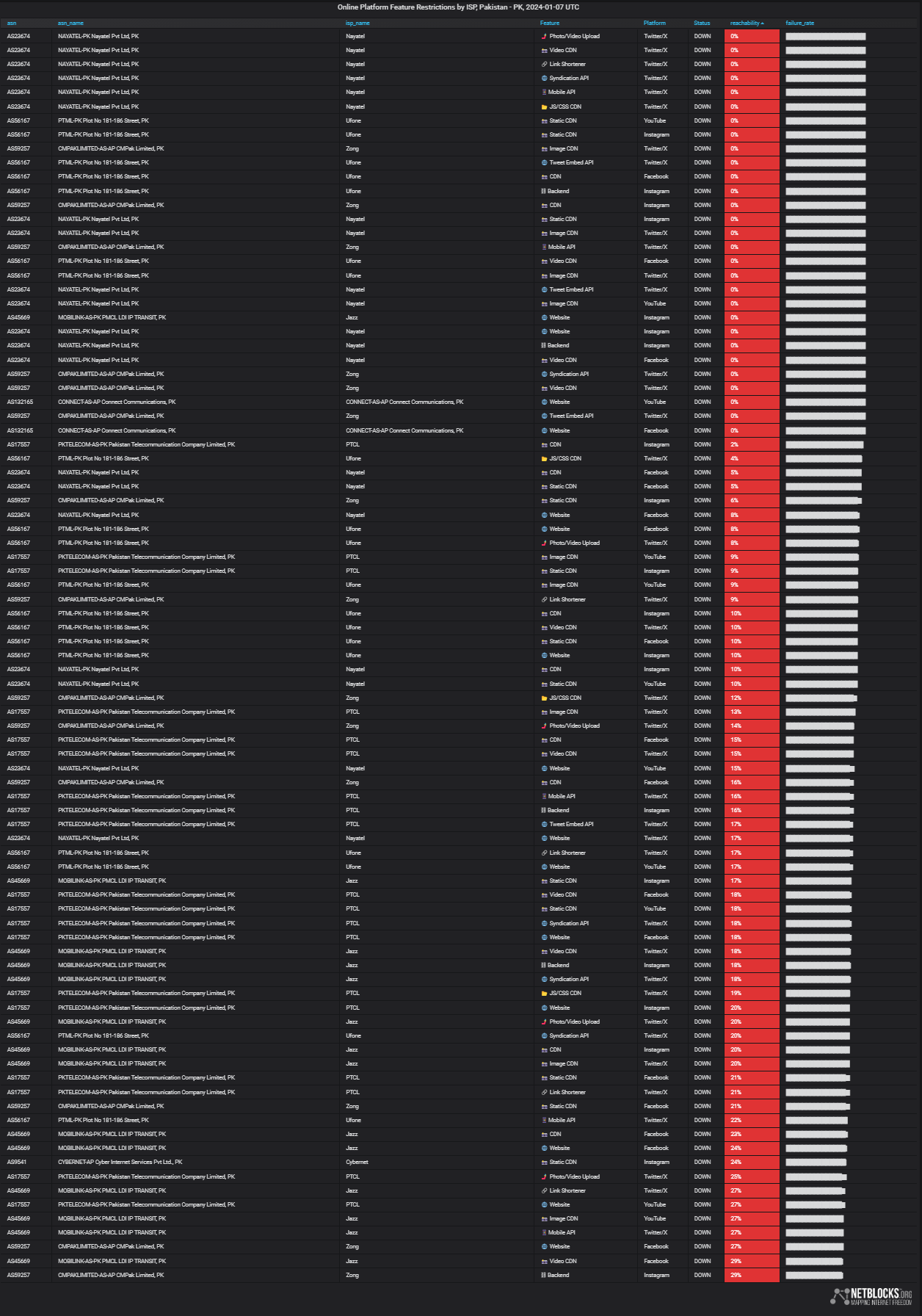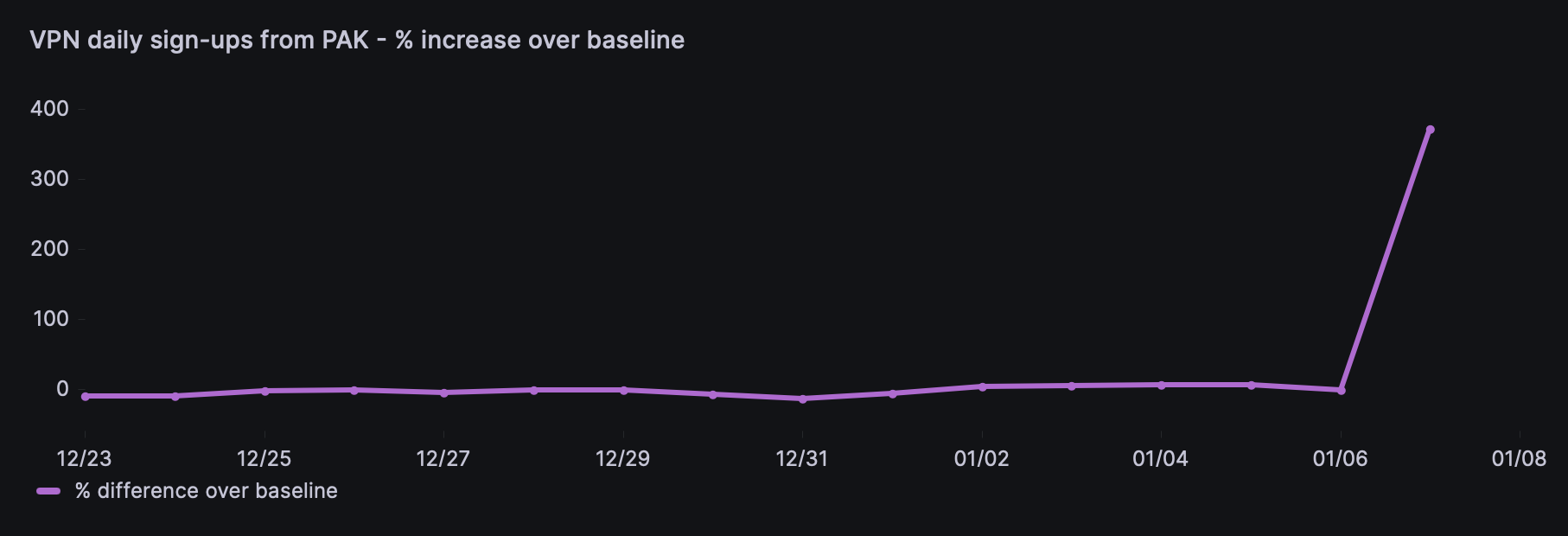
Access to main social media platforms have been restricted in Pakistan as of January 7, 2024, as its jailed former prime minister Imran Khan turned to the online world.
Already delayed by several months, general elections are expected to be held in Pakistan next month, on February 8. However, most senior leaders of Khan's Pakistan Tehreek-e-Insaf party (PTI)—himself included—have been prevented from taking part as candidates. Thus, the party decided to launch a massive online campaign to spread its manifesto and raise funds. This decision is the reason why internet access for those in Pakistan got disrupted.
Luckily, it's possible to overcome this type of disruption with a reliable VPN service and many citizens have reportedly bypassed the block at ease so far. Yet, these latest events shed another grim light on the country's political direction.
Politically targeted network censorship
"Live metrics show a nation-scale disruption to social media platforms across Pakistan, including X/Twitter, Facebook, Instagram and YouTube; the incident comes as persecuted former PM Imran Khan's party, PTI, launches its election fundraising telethon," tweeted UK-based internet watchdog NetBlocks on January 7.
Netblock's founder and director Alp Toker explained the measure was put in place a couple of hours before the start of the fundraiser rally. The service was restored when the event came to an end, on Sunday from 8 pm UTC.
"While internet disruptions and shutdowns aren't infrequent around the world, Pakistan is on the leaderboard for politically targeted network censorship," Toker told me. These restrictions seem, in fact, to echo previous social media filtering campaigns imposed during rallies or speeches held by opposition leader Imran Khan.
Authorities throttled mobile internet connections alongside main social media platforms last May to crackdown on widespread protests over Khan's arrest. X, Facebook, Instagram and YouTube went dark in what Toker described to the BBC as "the most severe censorship that we've tracked for Pakistan in recent times."
Now, Toker has confirmed once again the gravity of Pakistan's censorship efforts with network providers impacted all over the country by so-called Just-in-Time filtering. "We've tracked this kind of nation-scale measure in only a few countries around the world like Venezuela, where Juan Guaido's speeches were targeted in a similar manner to Imran Khan and the PTI events," he told me.

The Human Rights Council of Pakistan has also strongly criticized the move, deeming it as "a violation of international law." The organization wrote in a tweet: "HRC Pakistan believes that all political parties have the right to carry out their activities. In the context of elections, all political parties should get the basic right of freedom of expression. It is the responsibility of the government of Pakistan to uphold fundamental rights."
Nonetheless, these disruptions didn't stop citizens attending the online rally as many quickly turned to circumventing tools to bypass government-imposed restrictions. Short for virtual private network, a VPN is the most popular solution when it comes to internet outages as it spoofs users' IP addresses to grant access to geo-restricted content. Unlike similar software such as proxy services, VPNs also encrypt internet connections for better online anonymity.
Antonio Cesarano, Head of Product at Proton VPN, told me that the business has recorded a 400% increase in sign ups starting from January 6. He said: "We already have a significant existing user base in Pakistan due to a history of internet censorship in the country, so this spike is particularly notable."
"More specifically, this is the second time in recent months that we have seen internet outages that coincide with online events planned by the Pakistani opposition party, PTI," he added. Authorities reportedly slowed down internet speeds and blocked access to main social media apps last month, too, to disrupt a big PTI virtual election rally.
It looks like the VPN spike is now over though, with the provider confirming to see normal activity in Pakistan starting from Monday January 8.

Originally scheduled for November last year, a non-binding resolution pushed the Pakistan's general elections to next month amid a rise of security incidents as well as harsh weather conditions—Al Jazeera reported.
The cricket star-turned-Prime Minister Khan was first removed from office in April 2022 and then charged in August last year to a three-year sentence for alleged corruption. Despite a Pakistani appeals court suspending the prison term, he remains in prison accused of leaking state secrets. He denies all charges.
Government caretaker leader Anwaar ul-Haq Kakar is now expected to oversee the vote to guarantee fair and transparent elections. Yet, such an outcome seems unlikely considering the latest politically motivated attack. On this point, talking to VOA, Syed Zulfiqar Bukhari from PTI said: "Once again, PTI has a virtual event, and once again, the internet is shut off.
"What has happened and is happening in Pakistan in the name of democracy is a slap in the face of transparency."







